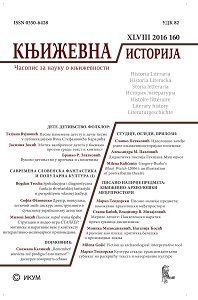Gregory Burke’s Black Watch (2006): an Illustration of Post–verbatim theatre
Gregory Burke’s Black Watch (2006): an Illustration of Post–verbatim theatre
Author(s): Milena M. KaličaninSubject(s): Other Language Literature
Published by: Институт за књижевност и уметност
Keywords: The National Theatre of Scotland;Black Watch;post–verbatim theatre;demystification;nationalism;imperialism;patriotism;
Summary/Abstract: Gregory Burke’s Black Watch (2006) is a documentary play based on the common soldiers’ authentic accounts of the war in Iraq. Coinciding with the foundation of the National Theatre of Scotland, Burke’s play was innovative in the sense that it “departed from the hyperrealist trend of verbatim plays of the post 9/11 era, infusing music, projection, movement and song to contextualize the accounts of local soldiers caught amidst a foreign policy disaster“ (Beck 2013: 131). Taking into account the political, in–yer–face and verbatim influences of theatre, whose main postulates are detected in Burke’s play and illustrated in the paper, the study focuses on Beck’s claim that Black Watch represents a vivid example of a post–verbatim theatre, employed in the service of demystification of the prevalent Western imperiali stand nationalist tendencies. Apart from Beck’s inspiring analytical views, the theoretical framework of the paper relies on acutely relevant critical insights of Cull, Hammond, Soans, Sierz, Rich, as well as Burke himself.
Journal: Књижевна историја
- Issue Year: 48/2016
- Issue No: 160
- Page Range: 303-317
- Page Count: 15
- Language: English

